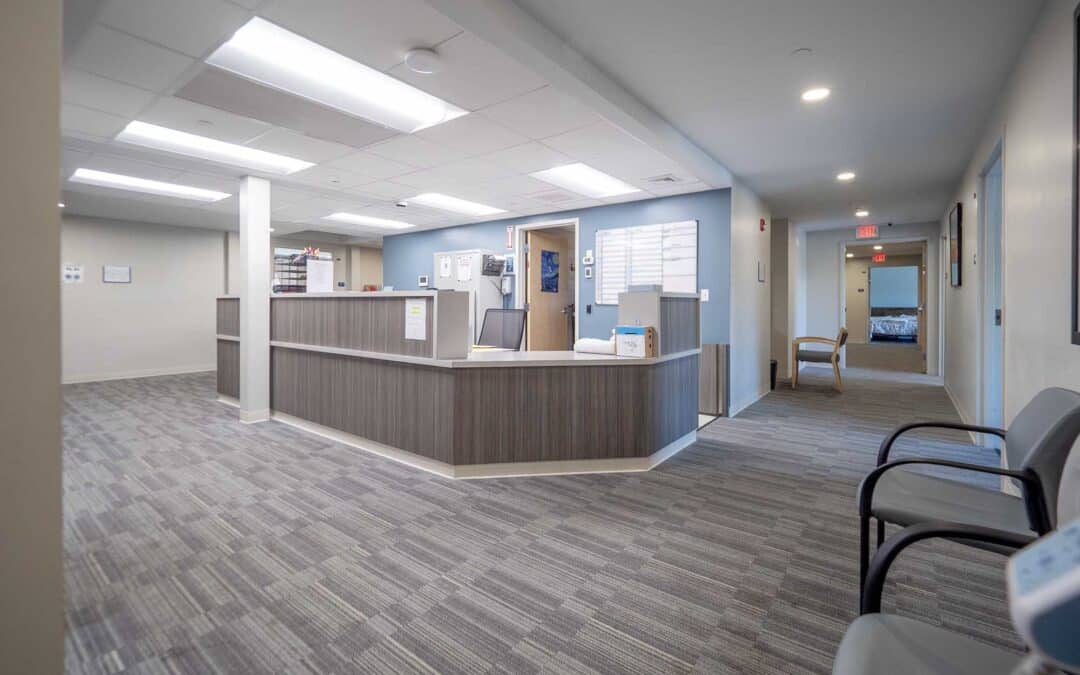Exploring the Benefits of Detox Centers
The journey to recovery from addiction is often challenging. It requires strength, commitment, and the right support.
One crucial part of this journey is detoxification. This is where detox centers or a detox hospital come into play.
Detox centers provide a safe environment for individuals to withdraw from substances. They offer medical supervision to manage withdrawal symptoms and complications.
These centers also provide medication for detoxing. This helps to alleviate discomfort and cravings during the detox process.
In this article, we will explore the benefits of detox centers. We will delve into their role in recovery, the specialized programs they offer, and how they help manage withdrawal symptoms.
Whether you’re seeking help for yourself or a loved one, this information could be a vital first step towards recovery.
Understanding Detox Centers and Their Role in Recovery
Detox centers are specialized facilities focused on helping individuals safely withdraw from addictive substances. These centers play a pivotal role in the recovery process. They provide the initial phase of treatment, which is essential for long-term success.
The primary objective of detox centers is to stabilize patients physically. This stabilization sets the foundation for further treatment, allowing individuals to focus on underlying psychological issues. Without this crucial step, the risk of relapse increases.
Detox facilities offer more than just physical detoxification. They provide mental and emotional support to individuals as they navigate the withdrawal process. This comprehensive approach aids in a smoother transition to sobriety.
A key feature of detox centers is individualized care. Treatment plans are tailored to address the unique needs of each patient. This ensures that everyone receives the appropriate level of support and care during detoxification.
Some of the core roles of detox centers include:
- Providing a supervised environment for withdrawal.
- Offering medical and emotional support during detox.
- Developing customized treatment plans.
- Preparing individuals for ongoing therapy and aftercare.
Overall, detox centers are crucial for the recovery journey, offering a safe and structured environment to begin healing.

The Safe Environment of Detox Centers
Detox centers prioritize safety as a foundational aspect of their services. They offer a controlled environment where individuals can begin their recovery journey without external stressors.
The presence of trained medical staff is a key component of ensuring safety. These professionals are equipped to manage any complications that may arise during detox.
Furthermore, detox centers implement strict security measures to prevent contraband and ensure patient safety. This helps in maintaining a secure atmosphere conducive to recovery.
By offering a structured setting, detox facilities allow patients to focus solely on their healing process without distractions or external influences.
Medical Supervision and Medication for Detoxing
Medical supervision is a cornerstone of detox centers. Trained professionals oversee the detox process to ensure safety and effectiveness.
Detoxing can be challenging and uncomfortable. The presence of medical staff helps to manage withdrawal symptoms that can arise during detox.
Medication for detoxing plays an essential role in alleviating discomfort and reducing cravings. These medications are carefully prescribed and monitored by healthcare providers.
Each medication plan is personalized to meet the individual’s needs. This tailored approach helps in addressing specific withdrawal symptoms associated with different substances.
With medical supervision and appropriate medication, patients receive the support they need. These factors significantly increase the chances of successful detoxification.
Specialized Detox Programs: From Opioid to Methamphetamine Treatment
Detox centers offer specialized programs for various substance addictions. These programs cater to the unique challenges of different drugs.
Opioid addiction requires specific focus and treatment. Opioid treatment centers provide targeted therapies and medication-assisted detox.
Methamphetamine addiction presents distinct challenges. Methamphetamine treatment centers tailor their approaches to address both the physical and psychological impact.
Programs often include a mix of therapies and medical interventions. They work to stabilize patients and prepare them for continued recovery.
Here’s a list of some specialized detox programs:
- Opioid Treatment Centers
- Methamphetamine Treatment Centers
- Alcohol Detox Programs
- Women’s Rehab Programs
These specialized programs ensure focused care and support. They address the unique needs of each patient, facilitating more effective recovery outcomes.
Opioid Treatment Centers
Opioid treatment centers are crucial for managing opioid withdrawal. These centers employ methods that help alleviate intense cravings and withdrawal symptoms.
Medication-assisted treatment is a cornerstone of opioid detox. It involves administering medicines like methadone or buprenorphine under careful supervision.
The structured environment ensures that patients remain safe. It also prepares them for ongoing therapy and long-term recovery.
Women’s Rehab and Men’s Rehab: Gender-Specific Care
Gender-specific rehab programs offer tailored care. Women’s rehab focuses on the unique challenges women face during addiction and recovery.
Men’s rehab provides targeted support and activities that engage and motivate male patients. Both aim to create environments where individuals feel understood and supported.
These programs often incorporate gender-specific therapies. This approach enhances comfort and communication, improving recovery outcomes.
Alcohol Detox Programs: Managing Withdrawal Risks
Alcohol detox centers are essential for handling withdrawal risks. Alcohol withdrawal can be severe and requires medical oversight.
These programs utilize a structured detox process to manage symptoms safely. Patients receive medical monitoring to address potential complications, such as seizures.
Comprehensive care ensures that patients safely transition through withdrawal. The focus is on stabilizing their condition and preparing them for further treatment.
Common Withdrawal Symptoms and How Detox Centers Help
Withdrawal symptoms can vary based on the substance involved. Heroin, for example, commonly causes muscle aches and nausea.
Detox centers play a pivotal role in managing these symptoms. They provide both medical and emotional support to ease the discomfort.
Here are some common withdrawal symptoms:
- Anxiety and irritability
- Muscle and joint pain
- Nausea and vomiting
- Sleep disturbances
- Sweating and chills
These symptoms can be severe and distressing. Detox centers offer medications to reduce the intensity and duration of withdrawal.
Emotional support is equally important during this phase. Counselors and therapists assist patients in coping with emotional stress.
The environment of a detox center is structured to ensure safety. This helps patients manage withdrawal in a controlled, supportive setting.
Through these comprehensive measures, detox centers effectively minimize withdrawal struggles, paving the way for continued recovery.
The Continuum of Care: From Detox to Aftercare
Detoxification is just the beginning of a journey towards recovery. It’s the first step that sets the stage for future success.
After detox, patients transition to therapy and counseling. This is crucial for addressing the psychological aspects of addiction.
Detox centers often provide or coordinate ongoing treatment. This includes outpatient programs, group therapy, and support groups.
The goal of aftercare is to maintain sobriety. It focuses on relapse prevention and coping strategies for everyday challenges.
A solid aftercare plan is tailored to each individual. It may include vocational training, family therapy, or sober living arrangements.
Continuing support is vital for long-term recovery. It helps individuals build a strong foundation for a drug-free future.
The continuity from detox to aftercare increases the likelihood of sustained sobriety. It bridges the gap between treatment and daily life.
This ongoing care ensures patients do not feel abandoned post-detox, fostering resilience and independence.
Finding a Drug Detox Center Near Me
Locating a suitable detox center is a critical step towards recovery. Many resources can help you find the right facility nearby.
Online directories such as SAMHSA are valuable for pinpointing local detox facilities. These platforms often provide details about services and reviews.
Healthcare providers can offer recommendations based on your needs. It’s wise to consult them for professional guidance.
Consider reaching out to community support groups. They may have insights or personal experiences to share about local options.
The Importance of Individualized Treatment Plans
Each individual’s journey through addiction is unique. Therefore, treatment must cater to personal needs and circumstances.
Detox centers develop customized plans for every patient. This approach considers substance use history, mental health, and personal goals.
Tailored care enhances the effectiveness of treatment. It addresses both the physical and psychological aspects of addiction recovery.
By focusing on individual needs, detox centers help set a strong foundation for sustained recovery. This personalized approach is vital to success.
Holistic Therapies and Multidisciplinary Teams in Detox Centers
Detox centers often incorporate holistic therapies into their programs. These therapies aim to heal the mind, body, and spirit as a whole.
Patients might engage in yoga, meditation, or art therapy. These activities support emotional well-being and stress reduction during detox.
A multidisciplinary team is pivotal in providing comprehensive care. This team typically includes doctors, nurses, therapists, and counselors.
Collaboration among professionals ensures a holistic approach. It helps address the varied needs of patients, enhancing the recovery process.
The Role of Family and Community in the Recovery Process
Family involvement can significantly bolster recovery efforts. Detox centers often encourage family therapy sessions.
These sessions aim to mend relationships and build support. They foster understanding and empathy between individuals and their families.
Community support plays an equally vital role. Support groups create a sense of belonging and accountability.
Detox centers may connect patients with local resources. They help establish a network for continued recovery and assistance.
The Lifesaving Impact of Detox Centers
Detox centers provide an essential foundation for recovery. By offering a structured and safe start, they enable a smoother transition to sobriety.
The comprehensive support they offer promotes lasting change. Through personalized care, they address both physical and emotional needs.
Detox centers are pivotal in reducing relapse risks and improving outcomes. They pave the way for healthier, more fulfilling lives beyond addiction.


